Remuneration Report
The Directors confirm that the Company has complied with the Principles and underlying Provisions relating to Directors' remuneration of The Combined Code on Corporate Governance and that this Remuneration Report has been prepared in accordance with the Directors' Remuneration Report Regulations 2002. Details of each individual Director's remuneration for 2008 are set out in this section. Information on Directors' share and share option interests may be found below.
Remuneration Committee: Composition, Responsibilities and Operation
The names of the members of the Committee who served during the year ended 31 December 2008 are as follows:
| Nigel Northridge | Chairman |
| Roy McGlone | (resigned 1 September 2008) |
| David Hamill | |
| Robert MacLeod |
The Committee has been entirely composed of Independent Non-executive Directors throughout the year. The members of the Committee have no personal financial interest, other than as shareholders, in the matters to be decided, no potential conflicts of interest arising from cross-directorships and no day-to-day operational responsibility within the Group.
The Committee's principal function is to determine the policy on remuneration for the most senior executives of the Group and to approve the specific remuneration of the Executive Directors and the Company Secretary, including their service contracts. The Committee also has responsibility for making a recommendation to the Board in respect of the remuneration of the Chairman. The Committee's remit therefore includes, but is not restricted to, basic salary, benefits in kind, performance related awards, share options and share awards, Long-term Incentive Schemes, pension rights, and any compensation or termination payments.
In exercising its responsibilities the Committee has access to professional advice, both inside and outside the Company, and consults with the Chairman and Group Chief Executive. The Company Secretary acts as Secretary to the Committee. The full Terms of Reference of the Committee are available on our website at http://ir.aggreko.com/agk_ir/cg/.
There are a number of external advisers appointed by the Company who advise on remuneration matters for the wider workforce and also provide advice to the Committee from time to time. Principal advisers in the year were as follows:
- Kepler Associates provided remuneration consultancy with respect to basic salary, bonus plans and executive Long-term Incentive Plans.
- New Bridge Street Consultants provided advice on the implementation and administration of share plans.
- Mercer Human Resource Consulting provided advice on retirement benefits in the UK and overseas and administers the Group's UK defined benefit pension scheme.
Remuneration Policy
The Committee has applied the following policy for the remuneration of Executive Directors throughout 2008. It is intended that, subject to any change in circumstances or best practice, this policy will apply in 2009 and in future years.
Annual Salaries
Salaries are determined by a combination of the individual's contribution to the business and the market rate for the position. The Company aims to pay the market median for standard performance and pays up to the market upper quartile for upper quartile performance. On occasions it may be necessary to pay above the market median to attract people of the right calibre to meet the needs of the business. In setting annual salaries, as with other elements of remuneration, the Committee has discretion to consider all relevant factors, including performance on environmental, social and governance issues.
The appropriate market rate is the rate in the market place from which the individual is most likely to be recruited. The Company operates in a number of market places throughout the world where remuneration practice and levels differ. This can result in pay and benefit differentials between the Executive Directors.
In arriving at an appropriate market rate, we commission studies from our advisers, who carry out in-depth research on the practices of Aggreko's peer group in the UK to establish accurate benchmarks. The same approach is taken for expatriate and overseas salaries where reference is made to the appropriate data for the geographical location.
The Company's pay systems are designed to allow progression that reflects an individual's contribution to the business and to control overall cost. Pay and benefit structures are designed to be cost effective to be able to attract and retain a high-quality executive management team whilst achieving best value for shareholders. The Company is always mindful of the need for good corporate governance in respect of pay and benefits for all its employees including Directors.
Performance related elements of Remuneration
At least 50% of Executive Directors' cash remuneration is related to performance; performance targets are related to audited measures such as Return on Capital Employed, Trading Profit or Group Diluted Earnings per Share. In designing the performance-related elements of remuneration for Executive Directors, the Remuneration Committee has sought to achieve a balance between incentives which drive short-term performance with those that reward long-term growth in shareholder value. For all Executive Directors, the potential awards available under the long-term incentives are larger than those available under short-term incentives. Executive Directors thus have a strong incentive not to sacrifice the long-term creation of value for short-term performance, and the Committee is satisfied that the Company's incentive structure does not raise environmental, social or governance risks by inadvertently motivating irresponsible behaviour.
Annual Bonus Scheme
The purpose of the Annual Bonus Scheme is to drive the short-term performance of the Group. Targets are measured against the performance of the business in a financial year. Bonuses are paid following Audit Committee approval of the previous year's trading results, at which point the targets and quanta of bonuses for the current year are set. Bonuses for Executive Directors with regional management responsibilities will generally have half of their bonus related to the performance of their area of the business, and half related to Group Diluted Earnings per Share (D-EPS); bonus targets are related to performance against the budgets approved by the Board. The Group Chief Executive and Finance Director's bonuses are measured exclusively against D-EPS. In 2008 the maximum bonus earnings for the Group Chief Executive and the Regional Director responsible for North America were 125% of salary, and of other Executive Directors 100% of salary.
Long-term Incentive Programme
A Long-term Incentive Programme was introduced in 2004 and revised with the approval of shareholders in 2008. Its purpose is to balance the Annual Bonus Scheme by providing an incentive which rewards long-term growth in earnings, returns on capital and share price appreciation. It also aids retention of talented senior managers. The Programme is implemented annually and consists of two distinct elements: the Performance Share Plan (PSP) and the Co-investment Plan (CIP). In 2008 120 individuals - about 4% of employees - were invited to join one or both of the Plans.
The CIP and PSP have common performance measurement periods (three years) and performance criteria (compound annual growth over the performance period of D-EPS and Return on Average Capital Employed). The PSP is a nil-cost conditional award of shares, some, all, or none of which vest depending on performance against the targets; the number of shares conditionally awarded is related to the salary of the individual concerned and their level within the Company. Since its inception, the largest Performance Share Plan award has been equivalent to 100% of the recipient's salary, although the rules of the scheme permit higher levels. The CIP offers individuals the opportunity to subscribe shares in Aggreko up to a maximum value of 30% of their salary each year they are invited to join the Plan; if they hold those shares for the entirety of the performance measurement period, they will be entitled to receive a minimum award of one share for every two they subscribed, plus a performance-related award of a further two shares for every three they subscribed.
The performance criteria for the Long-term Incentive Programme are set annually; in 2008 they were:
- 75% of the award will be measured against the real compound annual growth in D-EPS over the three-year performance measurement period in a range of 3% to 10%. No performance shares will be awarded against this element if performance is less than 3% and awards will increase straight-line to the maximum at 10% growth.
- 25% of the award will be measured against the average return on capital employed over the performance period in a range of 23% to 25%. No performance shares will be awarded against this element if performance is less than 23% and awards will increase straight-line to the maximum at 25% ROCE.
In addition to the above, and to reward truly exceptional performance, the number of shares awarded to participants in the Long-term Incentive Programme may be increased by between 1.3 and 2.0 times if the real compound annual growth in D-EPS over the three-year performance measurement period is in a range of 13% to 20%.
Sharesave Plans
The Board believes that Sharesave schemes are valuable in aligning the interests of employees and shareholders, and the Company seeks to make it possible for as many employees as practicable to join the scheme or its various proxies. The Aggreko Sharesave Plans are normally offered annually to employees and Executive Directors who have at least three months' continuous service, and allow a maximum of £250 per month to be saved and converted into Aggreko shares at the end of either three or five year periods.
Executive Share Option Schemes
Prior to 2004 senior executives were invited to participate in an Executive Share Option Scheme at the discretion of the Committee. Following the implementation of the Performance Share and the Co-investment Plans, no further grants have been, or will be, made under these existing Executive Share Option Schemes.
The allocation of Executive Share Options was based on multiples of remuneration dependent upon the seniority and job size of the individual's appointment, with the maximum multiple of 11/3 times remuneration in any one year being available to Executive Directors.
All executive options that have been granted are subject to performance conditions based on both total shareholder return (TSR) and growth in Earnings Per Share (EPS). TSR is calculated by reference to the increase in the Company's share price plus dividends paid. EPS is Basic Earnings Per Share as disclosed in the Group Income Statement.
At the time when the individual wishes to exercise the option (which can only normally occur after three years have elapsed since grant), the growth in the Company's TSR is compared with that of the FTSE Mid 250 Index (excluding investment trusts) over a specified period. If the Company's TSR matches or exceeds that index, and the Company's EPS growth matches or exceeds the growth in the Retail Prices Index plus 3% per annum, over a specified period, the option is capable of exercise. For options granted after 25 April 2001, retesting of performance conditions is limited to six monthly intervals between 3 and 5 years after the date of grant. For options granted before 25 April 2001, testing of the performance conditions is made with reference to EPS growth over three consecutive years prior to the date of exercise and TSR is measured for the period from the date of grant to the date of exercise.
Retention of Shares by Executive Directors
The Committee has adopted a policy that encourages Executive Directors to use the Long-term Incentive Plans and Executive Share Option Schemes to acquire and retain a material number of shares in the Company with the objective of aligning their long-term interests with those of other shareholders. Under this policy, on vesting of share grants, Executive Directors, who are not within five years of their normal retirement age, should hold at least 50% of the net proceeds in shares until their aggregate holding is equivalent to at least 100% of their salary.
Other Benefits
Other benefits, including pensions, are based on current market practice and take into account long-term trends in provision. Further details on pension provision are set out under Pension Entitlement.
Service Contracts and Notice Periods
All of the Executive Directors have service agreements that require one year's notice of termination from the individual and one year's notice of termination from the Company. Derek Shepherd has a service contract that expires on 1 May 2009 while other Directors have a normal retirement age of 60. On early termination, Executive Directors are entitled to basic salary and benefits for the notice period at the rate current at the date of termination.
External Appointments
Rupert Soames is a Non-executive Director of Electrocomponents plc and is permitted to retain earnings from this position; these earnings amounted to £42,500 for the year ended 31 December 2008 (2007: £18,667). Angus Cockburn is a Non-executive Director of Galiform Plc. He is permitted to retain his earnings from that position and these earnings amounted to £48,000 for the year ended 31 December 2008 (2007: £46,515).
Remuneration of Chairman and Non-executive Directors
The Board, within the limits set out in the Articles of Association, determines the remuneration policy and level of fees for the Non-executive Directors. The Remuneration Committee recommends remuneration policy and level of fees for the Chairman to the Board. Remuneration comprises an annual fee for acting as a Chairman or Non-executive Director of the Company. Additional fees are paid to Non-executive Directors in respect of service as Chairman of the Audit and Remuneration Committees and as Senior Independent Director. When setting these fees, reference is made to information provided by a number of remuneration surveys, the extent of the duties performed, and the size of the Company. The Chairman and Non-executive Directors are not eligible for bonuses, retirement benefits or to participate in any share scheme operated by the Company.
Service Contracts
The directors have service contracts or letters of appointment as follows:

* Replaces an earlier contract/letter of appointment.
** Increased to 1 year with effect from 17 November 2009.
Review of past performance
The following chart shows at the value as at 31 December 2008 of £100 invested in the Company on 31 December 2003 compared with the value of £100 invested in the FTSE Mid 250 over the same period. The other points plotted are the values at the intervening financial year-ends. The FTSE Mid 250 was selected as this general index is considered more appropriate than sector and peer group comparators given the unique nature of the Company's business.
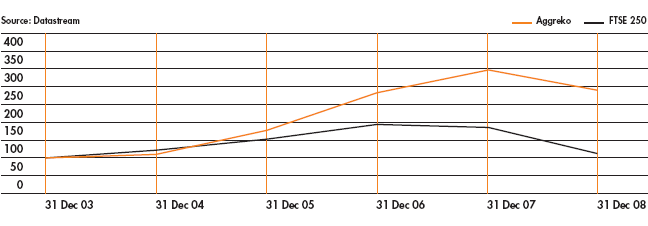
The following tables provide details of the emoluments, pension entitlements and share interests of the Directors. This information is audited.
Emoluments
The emoluments (excluding pension contributions) of Directors during the year and during 2007 were as follows:
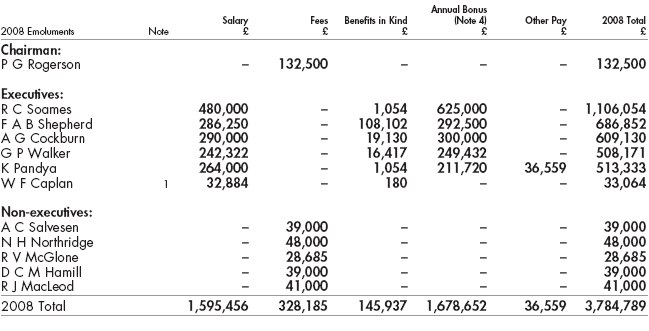

Note 1: 2008 Emoluments are from date of appointment on 17 November 2008.
Note 2: 2007 Emoluments are from date of appointment on 1 May 2007.
Note 3: 2007 Emoluments are from date of appointment on 10 September 2007.
Note 4: Annual bonus is calculated based on actual salary as at 31 December 2008.
Benefits in kind are made up of private health care, taxable life insurance benefits, car costs and the allowances paid to directors on expatriate secondment.
Other pay represents the amount paid to Directors in order to fund pension benefits beyond the HM Revenue and Customs earnings cap. Following 5 April 2006, Directors have been allowed to receive part of their pension entitlement as taxable pay.
Rupert Soames was the highest paid director. His entitlements under the Pension plan and details of his potential receipt of shares under the Executive Share Option Schemes and Long-term Incentive Arrangements are disclosed separately.
Performance targets were set for the 2008 annual bonus in March 2008. The Group Chief Executive and the Executive Director responsible for North America had a maximum bonus opportunity of 125% of basic salary and the other executive directors a maximum of 100%. The performance target for the Chief Executive and Finance Director was based solely on growth in Diluted Earnings Per Share and the performance target for regional Executive Directors was based as to 50% of bonus on growth in D-EPS, 40% as to growth in regional trading profit and 10% based on regional ROCE. The growth in D-EPS for the year was 52%. For Aggreko Europe, Aggreko International and Aggreko North America the growth in regional trading profit was 6%, 56% and 15% respectively and the regional ROCE was 24%, 48% and 31% respectively. This resulted in bonuses payable as percentages of salary for each of the directors as follows: Rupert Soames: 125%; Derek Shepherd: 100%; Angus Cockburn: 100%; George Walker: 101% and Kash Pandya: 79%.
Details of changes in basic salary and fees are set out in the table below. Kash Pandya's salary was increased to £290,000 with effect from 1 January 2009 on his appointment as Regional Director, Aggreko International and his move to Dubai. In the light of the challenging macro-economic environment the Board does not intend to award any increases in salary to Directors in 2009.
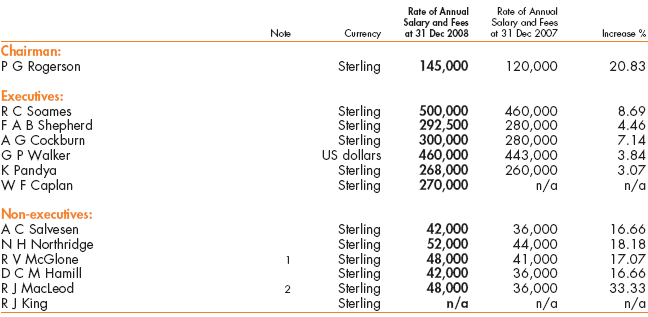
Note 1: Salary in bold as at retirement on 1 September 2008.
Note 2: Salary as at 31 December 2008 includes increase on appointment as Chairman of Audit Committee on 1 September 2008.
Pension Entitlements
Executive Directors participate in defined contribution plans that are designed to be in line with the median practice in the relevant country but Executive Directors who reside in the United Kingdom and who joined the Board before 1 April 2002 participate in a defined benefits plan.
Rupert Soames, Kash Pandya and Bill Caplan are members of the Aggreko plc Group Personal Pension Plan. Rupert Soames is entitled to a pension contribution from the Company of 25% of his basic salary and Kash Pandya and Bill Caplan are entitled to a Company contribution of 20%.
George Walker is entitled to participate in the Employees' Savings Investment Retirement plan and the Supplemental Executive Retirement plan of Aggreko LLC, which are governed by the laws of the United States. These plans allow contributions by the employee and the Group to be deferred for tax.
Contributions paid by the Company under the defined contribution plans during the year are as follows:

Angus Cockburn joined the Company before 1 April 2002 and is a member of the Aggreko plc Pension Scheme which is a funded, defined benefit scheme approved by HM Revenue & Customs. The key elements of his benefits are:
- a normal retirement age of 60;
- for service up to 31 December 2006, a benefits accrual rate of 1/30th for each year's service (final salary is subject to the earnings cap for service to 5 April 2006);
- for service after 1 January 2007 the accrual of benefits will be on a 'career average' basis at a rate of 1/30th for each year's service;
- an employee contribution rate of 6% of Pensionable Earnings; and
- a spouse's pension on death.
The following disclosure relates to Angus Cockburn's membership of the Scheme.

The transfer values have been calculated in accordance with the guidance note 'GN11' published by the Institute of Actuaries and Faculty of Actuaries.
The accrued pension is the amount which would be paid at the anticipated retirement date if the Director left service as at 31 December 2008, with no allowance for increases in the period between leaving service and retirement.
Angus Cockburn is also entitled to a pension of £2,162 per annum payable from age 60 from the Aggreko plc Pension Scheme resulting from benefits transferred in from the scheme of a previous employer. This benefit is not included in the above disclosure.
All Executive Directors who are members of a pension plan are provided with a lump sum death in service benefit of four times salary. Derek Shepherd is provided with a lump sum death in service benefit of two times salary.
Share Interests
The interests of persons who were Directors during the year in the share capital of the Company were as follows:

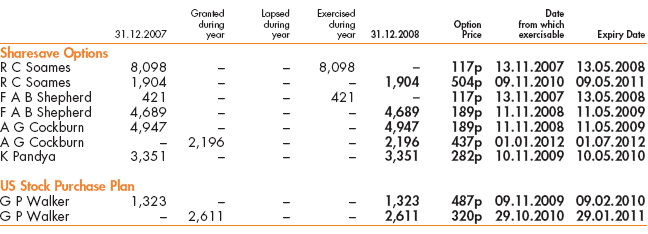
The options under the Sharesave Option Schemes have been granted at a discount of 20% on the share price calculated over the three days prior to the date of invitation to participate, mature after three years and are normally exercisable in the six months following the maturity date. The options under the US Stock Purchase Plan have been granted at a discount of 15% on the closing share price on the date of grant, mature after two years and are normally exercisable in the three months following the maturity date.
The options under the Executive Share Option Scheme are normally only exercisable once three years have elapsed from date of grant and lapse after ten years. The performance criteria that apply to the Executive Share Option Schemes are described above.
Awards under the Performance Share and Co-investment Plans are normally made three years after the date of grant and are subject to performance conditions which are described above.
Information relating to the exercise of options (including the vesting of shares) by the Directors is as follows:
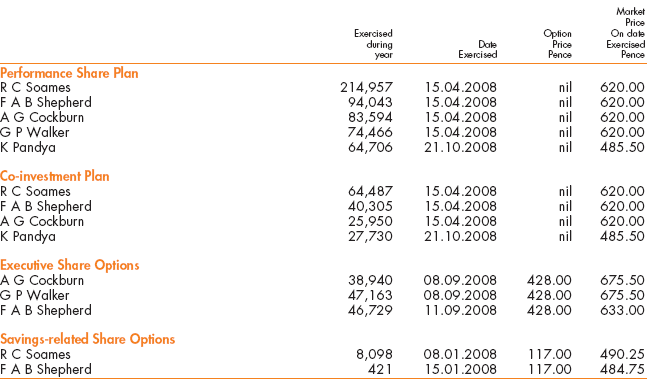
The aggregate gain made on these exercises was £4,495,823 of which £1,762,779 related to the gain of the highest paid Director.
The market price of the shares at 31 December 2008 was 445.75 pence and the range during the year was 366.75 pence to 734.50 pence.
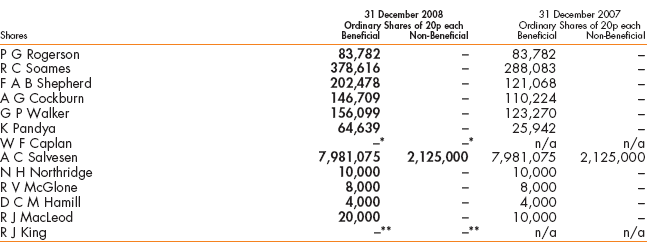
* As at date of appointment on 17 November 2008.
** As at date of appointment on 2 February 2009.
Rupert Soames, Derek Shepherd, Angus Cockburn, George Walker and Kash Pandya as Directors of the Company, have an interest in the holdings of the Aggreko Employee Benefit Trust (the 'EBT') as potential beneficiaries. The EBT is a trust established to distribute shares to employees of the Company and its subsidiaries in satisfaction of awards granted under the Aggreko Performance Share Plan 2004 and the Aggreko Co-investment Plan 2004. At 31 December 2008, the trustees of the EBT held a total of 3,825,034 Aggreko plc ordinary shares (2007: 3,459,679) and this holding remains unchanged at the date of this report.
Since 31 December 2008 Derek Shepherd has received 4,689 shares as the result of the exercise of Sharesave options and Angus Cockburn has received 4,947 shares as the result of the exercise of Sharesave Options. There have been no other changes in Directors' beneficial and non-beneficial interests in shares between the end of the financial year and the date of this report. No Director was interested in any shares of subsidiary undertakings at any time during the year.
Nigel Northridge
Chairman, Remuneration Committee
5 March 2009

